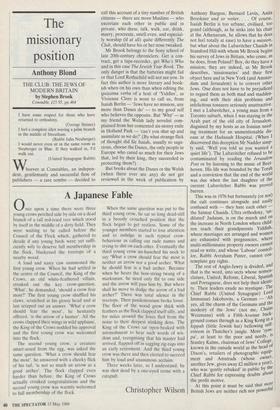The missionary position
Anthony Blond
THE CLUB: THE JEWS OF MODERN BRITAIN by Stephen Brook
Constable, f15.95, pp.464
I have some respect for those who have returned to orthodoxy.
(George Steiner)
I feel a complete idiot waving a palm branch in the middle of Streatham.
(Rabbi Julia Neuberger) I would never even sit in the same room as Neuberger or Blue. If they walked in, I'd walk out.
Whoever at Constables, an indepen- dent, gentlemanly and successful firm of publishers — a rare combo — decided to
(United Synagogue Rabbi) call this account of a tiny number of British citizens — there are more Muslims — who excoriate each other in public and in private, who dress, talk, walk, eat, drink, marry, procreate, smell even, and especial- ly worship (if at all) quite differently The Club, should have his or her nose tweaked.
Mr Brook belongs to the Sony school of late 20th-century chroniclers. Get a con- tract, get a tape-recorder, get Who's Who and in this case The Jewish Year Book. The only danger is that the batteries might fail or that Lord Rothschild will not see you. In fact this author is more literary and book- ish when on his own than when editing the ipsissima verba of a host of `Yiddles', as Vivienne Clore is wont to call us, from Isaiah Berlin — 'Jews have no mission, any more than Danes do' — to my good self who believes the opposite. But 'Why' — as my friend the Welsh lady novelist com- plained from her contented six-storey exile in Holland Park — 'can't you shut up and assimilate as we do?' (By what strange flick of thought did Sir Isaiah, usually so saga- cious, choose the Danes, the only people in Europe who cared so much for their Jews that, led by their king, they succeeded in protecting them?) But books about the Danes or the Welsh (when there ever are any) do not get reviewed in the week of publication by
Anthony Burgess, Bernard Levin, Anita Brookner and so weiter. . . . Of course, Isaiah Berlin is too urbane, civilised, too grand (although, as he sinks into his chair at the Athenaeum, he allows that he does not feel totally at ease) to have a mission, but what about the Lubavitcher Chasids in Stamford Hill with whom Mr Brook begins his survey of Jews in Britain, who come, as he does, from Poland? Boy, do they have a mission; they are indeed, as Mr Brook describes, 'missionaries' and their first object here and in New York (and Amster- dam and Jerusalem) is to convert other Jews. One does not have to be prejudiced to regard them as both mad and madden- ing, and with their skin problems and infelicitous tonsures seriously unattractive. I met a Lubavitcher, a young man from a Toronto suburb, when I was staying in the Arab part of the old city of Jerusalem, disguised by my hosts as an Iranian need- ing treatment for an unmentionable dis- ease at the Hadassah Hospital. (When I discovered this deception Mr Nadder simp- ly said, 'Well you told us you wanted a quiet life'). The Lubavitcher refused to be contaminated by reading the Jerusalem Post or by listening to the music of Beet- hoven. His life was bounded by the Torah and a conviction that the end of the world was due when the last daughter of the current Lubavitcher Rabbi was proved barren.
This was in 1976 but fortunately (or not) the cult continues alongside and easily confused with — they hate each other — the Satmar Chasids. Ultra orthodoxy, `un- diluted' Judaism, is on the march and on the increase in North London where child- ren teach their grandparents Yiddish, where marriages are arranged and women are exhausted with pregnancies, where multi-millionnaire property owners cannot read or write, and whose 'Labour' council- lor, Rabbi Avraham Pinter, cannot con- template gay rights. The rest of Anglo-Jewry is divided, and that is the word, into sects whose nomen- clature, United, Reform, Liberal, Spanish and Portuguese, does not help their identi- ty. Their leaders exude no mystique. The, Chief Rabbi (United Synagogue) DO' , Immanuel Jakobovits, a German — `A" yes, all the charm of the Germans and the modesty of the Jews' (not me, Chaim Weizmann) with a Fifth-Avenue back- ground comes through as a King Kong in a kippah (little Jewish hat) bellowing self- esteem in Thatcher's jungle. More `syM- pa' , at least to the poor and needy, is Stanley Kalms, chairman of Jews' College' known in the outside world as the head of Dixon's, retailers of photographic equip- ment and Amstrads (whose owner, another Jew, gives away £2 million a year), who was 'gently rebuked' in public by the Chief Rabbi for expressing doubts about the profit motive. At this point it must be said that most. British Jews are neither rich nor powerful nor more interesting in any particular than their fellow citizens. David Goldberg, the Rabbi moyen sensuel, who writes Pen- guins, has pointed out that they occupy the CDE rather than the AB categories in advertising parlance — taxi drivers and small shopkeepers. It must also be said that `philistinism and intolerance within the fold have persuaded countless gifted Jews to direct their energies away from the community' — the author — and that the most distinguished member of the most ancient Anglo-Jewish family 'is an Angli- can Bishop' — also, and fair enough, the author.



























































 Previous page
Previous page